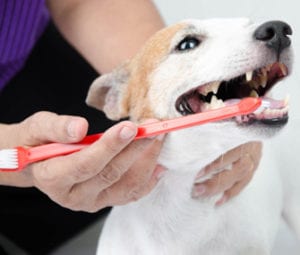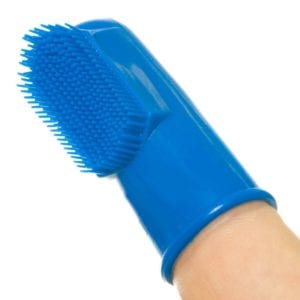Choosing between a dog and a cat can be tough. Typically,…
Dental Care For Pets
As a responsible adult, we all brush our teeth twice daily to fight off cavities and gingivitis. We were taught from a young age to care for our own bodies. We are also taught to care for our pet’s health, so why don’t people brush their pet’s teeth as often as their own? Approximately 75% of dogs and cats over the age of three have significant oral disease that requires treatment.

We may wonder, how often should I brush my pet’s teeth? Do I need to take them to a vet for a professional cleaning? How do I know if there is a problem that needs medical help?
How Often Should I Brush?
A healthy mouth is brushed every day whether it is your own or your pet’s. We can get away with simply brushing once per day with our pet’s, rather than the twice we require.
Bacteria in the mouth responsible for periodontal disease can replenish in a matter of 24-36 hours. If we want to provide our pet with the best chance for a healthy mouth, a daily cleaning is required.
My Pet Won’t Allow It!
Often it can be a scary, or unfamiliar experience for your pet when you begin your new brushing regime.
Stick with the routine and offer lots of praise along the way. The more often we expose the pet to the process, the easier it will be.
Start with a small brush that slips over your finger for an easier transition. Use a small amount of pet safe tooth
paste, and simply slip the brush in between the pet’s teeth and lips. Focusing on the gum line and the outside areas of the teeth. Brush gently in a circular motion for about 30 seconds on each side. Since this is pet safe tooth paste, a rinse is not required.
If you do this daily, your pet is on the road to a healthy mouth for their whole life!
Do I Need to See a Vet?
Every six months it is a good idea to get a basic examination from a veterinarian, even if you are not experiencing any problems.
A vet will be able to catch developing cavities and gum disease before they get worse.
Left for too long, an infected tooth can have numerous health consequences such as organ damage or even complications resulting in death.
Your dog may not exhibit any signs of pain, but only a visual inspection by a vet can determine the extent of the damage.
What Else Can I Do?
Daily brushing and vet visits are not all we can do to ensure our pet has a healthy mouth.
Diet plays a large role as well.
Ensure your pet has a diet that is low in sugar and has food and toy options that have an abrasive texture. Meaning, no people food (almost everything we eat has sugar in it somehow), and provide toys that interest the dog as well as remove plaque.
For example, deer antlers are a great choice for your dog to chew on! They are fibrous and will help remove the bacteria causing plaque.
Other options include special food that scratches off the plaque as the pet eats.
With daily brushing, visits to the vet, and proper chew toys, your pet is guaranteed a clean mouth free of painful disease!

